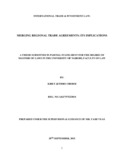| dc.description.abstract | With the vast number of existing and emerging trade arrangements in developing states particularly in Africa, through entering into bilateral and regional trade agreements without due regard to the implications appurtenant to such arrangements leads to failure in achieving its objectives and goals and ultimately collapse. This has been necessitated by various reasons including the overlap of membership in various trade bodies, uncertainty and confusion. If countries in developing world realize the benefits of trade bodies then it will highly benefit since regional trade agreements (RTA) present opportunities for controlling technical barriers to trade.
The non-committal by states parties to trade agreements and economic bodies has resulted to the trade agreements being mere paperwork and the trade blocs being more of a stumbling block rather than stepping blocs towards attaining economic development through trade. In order therefore to cure the problem most states have decided to explore options of merging existing bilateral trade agreements and trade bodies or blocs to form a single unified trade bloc, to regulate and oversee trade among member states and thus expanding the market for trade and reaching a huge population target.
The research will explore existing trade agreements in developing countries particularly in Africa, examine the effectiveness of the agreements whether they have lived up to its purpose by opening free trade between member states and if the same have led to economic development through fostering trade among the member states in the agreements. A comparative analysis will be conducted with other trade bodies outside Africa, most particularly American and Far East trade bodies.
xx
The case study in this research work will be the East African Community (EAC), Common Market of East and Southern Africa (COMESA), and Southern Africa Development Community (SADC) and its proposal to merge and form one unified trade body. The study will try to come up with a detailed analysis of the said trade blocs, their achievements and failures and try to make assumptions on whether merging of the bodies will in real sense boost trade among member states or the same becoming a stumbling block towards free trade and movement of goods between member states | en_US |



